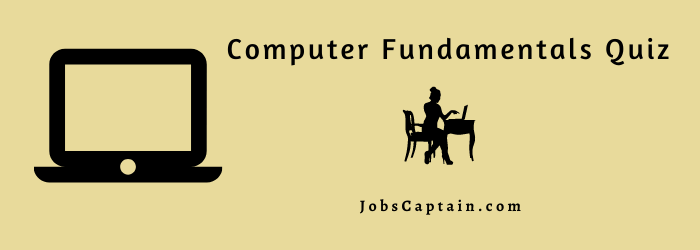
Basic Computer Knowledge is one of the most important part in the competitive entrance examination. All quizzes on Computer Fundamentals have answers available with pdf.
Evaluate your Basic Knowledge of Computer skills by trying the below online basic Computer Fundamentals question answer quiz.
Computer Fundamentals Questions & Answers
Question 1: An area of a computer that temporarily holds data waiting to be processed is ___________.
(A) CPU
(B) Storage
(C) Memory
(D) File
Question 2: Data becomes __________ when it is presented in a format that people can understand and use.
(A) information
(B) graphs
(C) processed
(D) presentation
Question 3: A _____________ is a microprocessor -based computing device.
(A) mainframe
(B) workstation
(C) server
(D) personal computer
Question 4: RAM can be treated as the ____________ for the computer’s processor.
(A) operating
(B) waiting room
(C) factory
(D) planning room
Question 5: Which of the following are the functions of a operating system?
(A) Manages disks and files
(B) Monitors Activities
(C) Allocates resources
(D) All of the above
Question 6: To move a copy of file from one computer to another over a communication channel is called?
(A) File transfer
(B) File copying
(C) File modification
(D) File encryption
Question 7: The primary function of the ______________ is to set up the hardware and load and start an operating system.
(A) Memory
(B) BIOS
(C) CPU
(D) System Programs
Question 8: What kind of memory is both static and non -volatile?
(A) ROM
(B) RAM
(C) CACHE
(D) BIOS
Question 9: ___________ is computer software designed to operate the computer hardware and to provide platform for running application software.
(A) Operating system
(B) Software
(C) System software
(D) Application software
Question 10: The _____________ is the amount of data that a storage device can move from the storage medium to the Computer per second.
(A) data access rate
(B) data migration rate
(C) data digitizing rate
(D) data transfer rate
Question 11: What is the other name for programmed chip?
(A) LSIC
(B) RAM
(C) PROM
(D) ROM
Question 12: On-line real time systems become popular in ___________ generation.
(A) Second Generation
(B) Third Generation
(C) First Generation
(D) Fourth Generation
Question 13: ____________ is the ability of a device to “jump” directly to the requested data.
(A) Sequential access
(B) Quick access
(C) Random access
(D) All of the above
Question 14: _________ provides process and memory management services that allow two or more tasks, jobs, or programs to run simultaneously.
(A) Multi-computing
(B) Multi-threading
(C) Multiprocessing
(D) Multitasking
Question 15: The task of performing operations like arithmetic and logical operations is called ___________ .
(A) Processing
(B) Sorting
(C) Storing
(D) Editing
Question 16: ALU and Control Unit jointly known as _____________ .
(A) ROM
(B) CPU
(C) RAM
(D) PC
Question 17: RAM is an example of ______________ .
(A) Main memory
(B) Secondary memory
(C) Primary memory
(D) Both (1) and (2)
Question 18: Magnetic disk is an example of ____________ .
(A) Primary memory
(B) Main memory
(C) Both (1) and (2)
(D) Secondary memory
Question 19: Which one of the following is NOT a computer language?
(A) MS-Excel
(B) C++
(C) COBOL
(D) BASIC
Question 20: RAM is also called as _________ .
(A) Long Memory
(B) Primary Memory
(C) Permanent Memor
(D) Read / Write Memory
